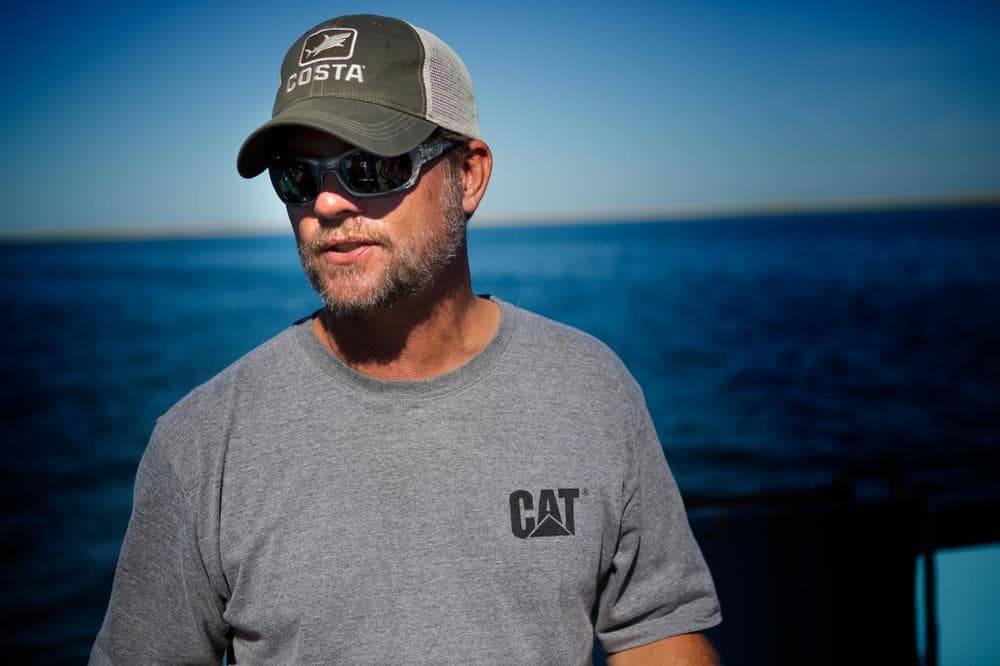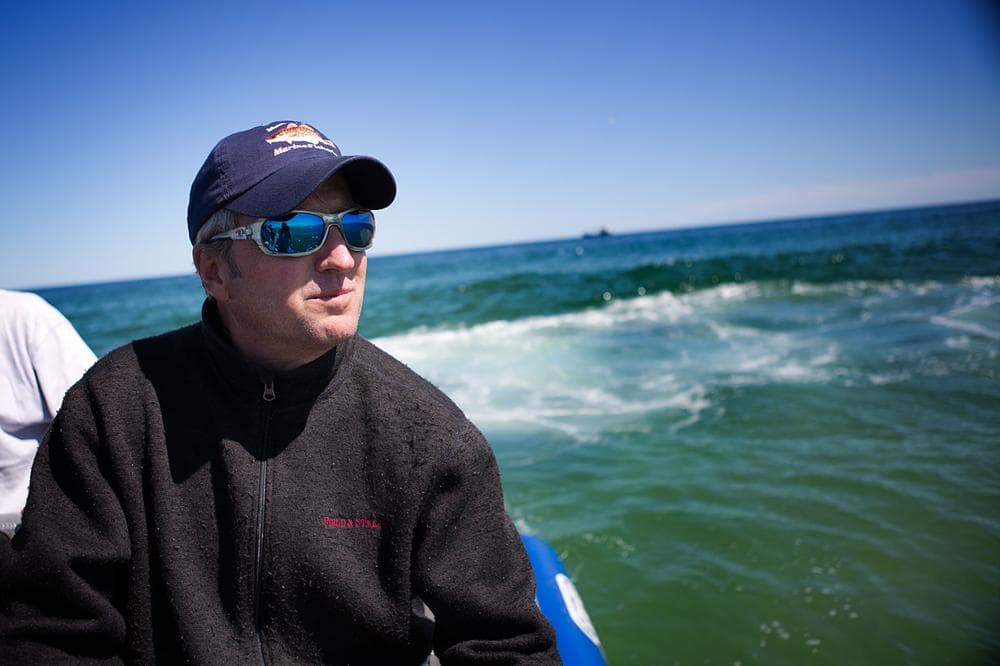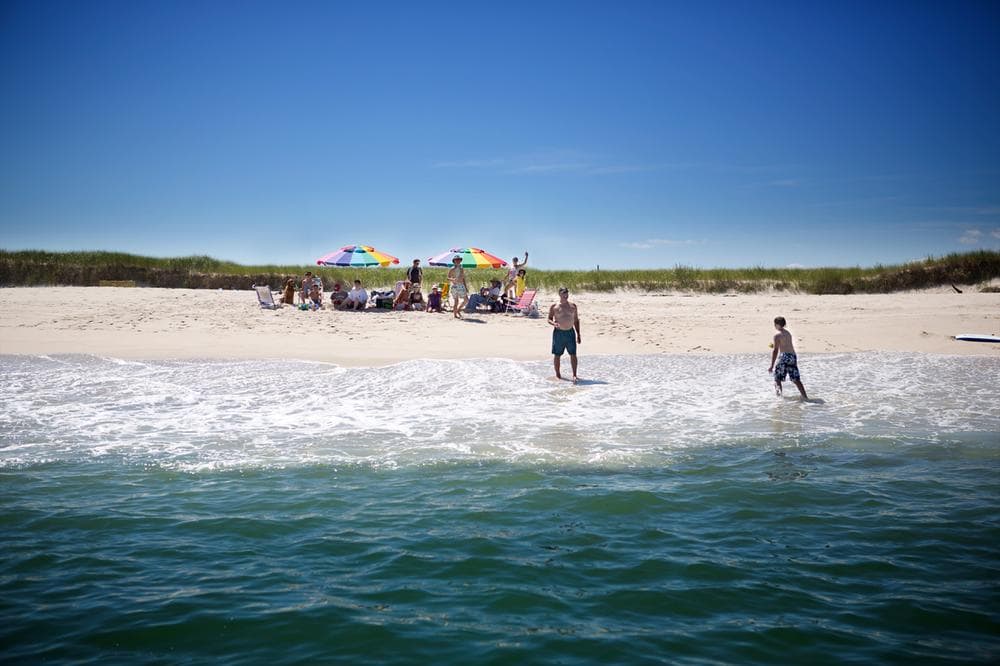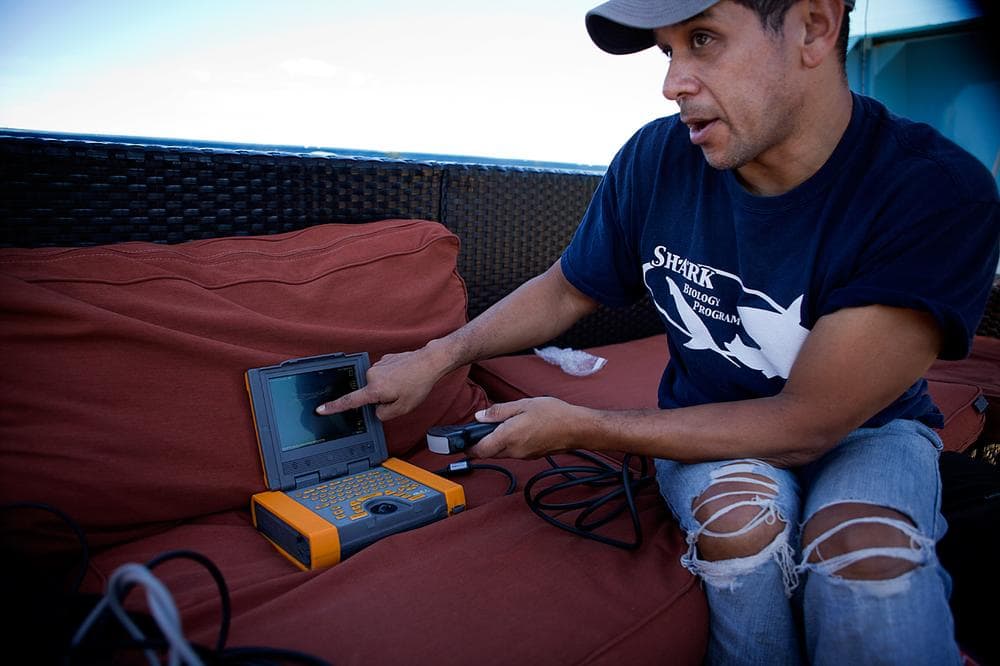Advertisement
Researchers Search For 'Timid' Great Whites Off Cape Cod
Off the coast of Cape Cod right now, a group of fishermen and scientists is conducting what they're calling the largest great white shark research expedition in U.S. history. It's a month-long project and involves first catching great whites and then hoisting them out of the water to be tagged and studied before they're released. And Tuesday, WBUR's Sacha Pfeiffer and Lynn Jolicoeur got to go along.
CHATHAM, Mass. — What a dream assignment: a trip on a boat on a gorgeous Cape Cod summer day and the chance to see up close one of the most fascinating and fearsome creatures in the ocean. But even cushy gigs have downsides.
First, we learned we'd be on the boat for 12 hours with no ability to get off early if we got seasick. Then, after a small motor boat took us from a beach in Chatham to the main research vessel, another surprise from the man in charge, Chris Fischer, who runs a nonprofit shark research organization called OCEARCH.
"Before I got on this boat today," I tell him, "I thought we'd be zooming around the Atlantic chasing sharks with the boat moving a lot, but we're going to be stationary a lot today."

"Yes," Fischer confirms. "What we've found with white sharks is we've never been successful chasing them and then trying to capture them. You have to get yourself in a position where they want to come and they have a mind to eat. So what we're trying to do is get located and allow them to come to us."
So we settle in for a sunrise-to-sunset stay-in-place outing on a three-story boat equipped with a washer/dryer and even a basketball hoop for the crew. We were just a mile off the coast of Chatham and within view of Monomoy Island, a remote wildlife refuge, the whole time. We knew catching a great white wasn't a guarantee; we joined the expedition on its fifth day and by that point it had only seen sharks. Even Fischer acknowledged the challenge.
"The sharks are more nervous than any sharks we've ever dealt with before," he says. "They're the wildest body of fish we've ever dealt with. They're not used to coming up to boats and sniffing around. So far we've seen seven animals and they basically have not given us the time of day. And we must turn that around if we're going to do what we need to do to solve this puzzle here."
Advertisement
The puzzle is all the unknowns about great whites, which scientists are still trying to learn very basic information about. That's where a piece of equipment that's basically a huge forklift comes in.
"It's what makes the impossible possible," Fischer says. "This allows us to pick up 5,000-pound animals and have 15 minutes of access to them, alive, to figure where they're breeding, where they're feeding, what they're eating. Are they related to other white sharks around the world? What sort of parasites are they catching? How much stress are they going through?"
Twelve research projects are done on each shark during the 15 minutes it's out of the water. The sharks’ eyes are covered to keep it calm and a hose is put in its mouth to keep it hydrated. The blood and tissue and muscle samples they yield are valuable to scientists. The top researcher on the boat is Greg Skomal, a shark expert with the Massachusetts Division of Marine Fisheries, and soon after we board the ship he gives us some exciting news.

"We've just got a report from the Orleans harbormaster, who happens to be in the helicopter patrolling the beach there, that he spotted a large white shark,” Skomal says. “Not sure how big. So I'm trying to locate that now."
The research boat tries to attract any spotted sharks by chumming the water and dragging a buoy that, from underwater, looks like the silhouette of a seal. But so far, no bites. Skomal says that may be because the sharks prefer the live food in the area: the hundreds of gray seals on Monomoy.
"They also seem to be somewhat shy or timid," Skomal says. "We never think of that in terms of white sharks, right? We're always accustomed to thinking of white sharks being a highly aggressive animal that will attack anything, and that's really not the case. If anything, we've proven that these white sharks are hesitant to take a bait ... They check it out and if it doesn't quite match what they want, they are out of here."
By mid-afternoon we've spotted no sharks from the ship. So the OCEARCH crew takes us on a smaller boat to see some of the gray seals on Monomoy. To Greg Skomal's disbelief, we discover a group of people on the beach, right where the copter saw a great white earlier.

"You couldn't pay me a million dollars to swim from here to shore," he says. "I've seen too many white sharks here."
So our boat captain approaches the shore and warns them. But instead of heeding that caution, some of the men on shore shout back that they're more likely to get in a car accident than be attacked by a shark. They even yell out the correct fact — we looked it up — that no one has been killed by a shark in Massachusetts since 1936. Incredulous, our captain wishes them good luck and heads back to the ship.
Among the researchers onboard is Heather Marshall, a doctoral candidate at UMass Dartmouth studying stress physiology in sharks. Her primary mission is to determine how much the capture process affects the stress level of sharks, and so far her research indicates they bounce back easily.
Also on the boat is biology professor Jim Gelsleichter of the University of North Florida, who shows us a portable ultrasound machine he'll use on any female shark brought on board. He wants to learn more about where sharks breed and raise their young so their habitat can be protected.

But by late afternoon, still no great whites to study. Skomal, the state shark expert, stays optimistic because he's seen this crew catch sharks before. In fact, it was on an OCEARCH research trip that he saw his very first great white that wasn't underwater or dead.
"Probably one of the most amazing experiences of my life," he recalls. "You really get a much greater sense of the mass of these animals and the power of these animals. It makes you feel somewhat insignificant when they're right next to you."
Another reason to be hopeful: Skomal says he was on an OCEARCH expedition in Florida this spring, ready to give up after seven days of failure, when it suddenly snared a 14-foot great white and hauled it onboard.
“Everything can turn on dramatically, real quick, because of something we do, something the weather does, or something some fish God does somewhere in the sky," Skomal says. "I don’t know. All I know is we can go from zero to 10 sharks pretty quickly if it all changes.”
"So today wasn't our lucky day," I say to him, "but you might be here for a lucky day later on this month?"
"I'm not one to make predictions," he says, "but I bet we catch a shark soon."
OCEARCH has set the ambitious goal of catching between eight and 20 great whites in 30 days. By Wednesday afternoon, though, still no sharks, but the ship's crew has the whole month of August ahead.
This program aired on August 7, 2013.

